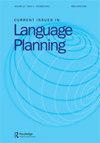母语者:标准、国家和变体的边界标记
IF 1.8
1区 文学
Q2 EDUCATION & EDUCATIONAL RESEARCH
引用次数: 1
摘要
摘要本研究比较了五种欧洲语言在语言标准意识形态和规范话语中使用母语者概念作为合法资源的情况。许多研究和国际讨论都集中在以英语为母语的人身上,英语是一种象征性的国际语言。我们的目的是展示母语者概念在国家标准意识形态中的不同作用。本研究对五种欧洲标准化意识形态进行了简要的比较,对三种这样的意识形态进行了仔细的研究,并对母语人士在一种国家语言(即瑞典语)的句法结构的规范话语中的作用进行了个案研究。许多语言规划和标准化都依赖于学术语言学的合法性,而母语人士的判断是理论语言学中无可辩驳的数据来源。然而,母语者作为语言材料的评判者的概念在规范话语中被重新文本化了。通过对国家标准意识形态和规范话语的分析,结果表明,母语者可能会因言语群体和标准意识形态的异质性而产生不同的影响。我们认为,母语者可能是标准语言的边界标记,但在民族语言中,也被视为语言内变异,因此在象征意义上是国家。本文章由计算机程序翻译,如有差异,请以英文原文为准。
The native speaker: a border marker of the standard, the nation, and variation
ABSTRACT The study compares the uses of the native-speaker concept as a legitimizing resource in language-standard ideologies and normative discourse in five languages of European origin. Much research and international discussion has focused on the native speaker of English, a symbolically international language. We aim to show how the native-speaker concept may function differently in national-standard ideologies. The study entails a concise comparison of five European standardization ideologies, a closer look at three such ideologies, and a case study of the native speakers’ function in the normative discourse on a syntactic construction of a national language, namely Swedish. Much language planning and standardizing relies on academic linguistics for legitimacy, and native speakers’ judgments are an irrefutable data source in theoretical linguistics. However, the concept of the native speaker as a judge of linguistic material is recontextualized in normative discourse. Drawing on analyses of national-standard ideologies and standardizing discourse, results indicate that the native speaker may have different repercussions depending on the heterogeneity of the speech community and the standard ideology. We argue that the native speaker may function as a border marker of the standard language, but in national languages also of what is considered intralingual variation, and thus in symbolic terms the nation.
求助全文
通过发布文献求助,成功后即可免费获取论文全文。
去求助
来源期刊

Current Issues in Language Planning
Multiple-
CiteScore
4.80
自引率
16.70%
发文量
26
期刊介绍:
The journal Current Issues in Language Planning provides major summative and thematic review studies spanning and focusing the disparate language policy and language planning literature related to: 1) polities and language planning and 2) issues in language planning. The journal publishes four issues per year, two on each subject area. The polity issues describe language policy and planning in various countries/regions/areas around the world, while the issues numbers are thematically based. The Current Issues in Language Planning does not normally accept individual studies falling outside this polity and thematic approach. Polity studies and thematic issues" papers in this journal may be self-nominated or invited contributions from acknowledged experts in the field.
 求助内容:
求助内容: 应助结果提醒方式:
应助结果提醒方式:


